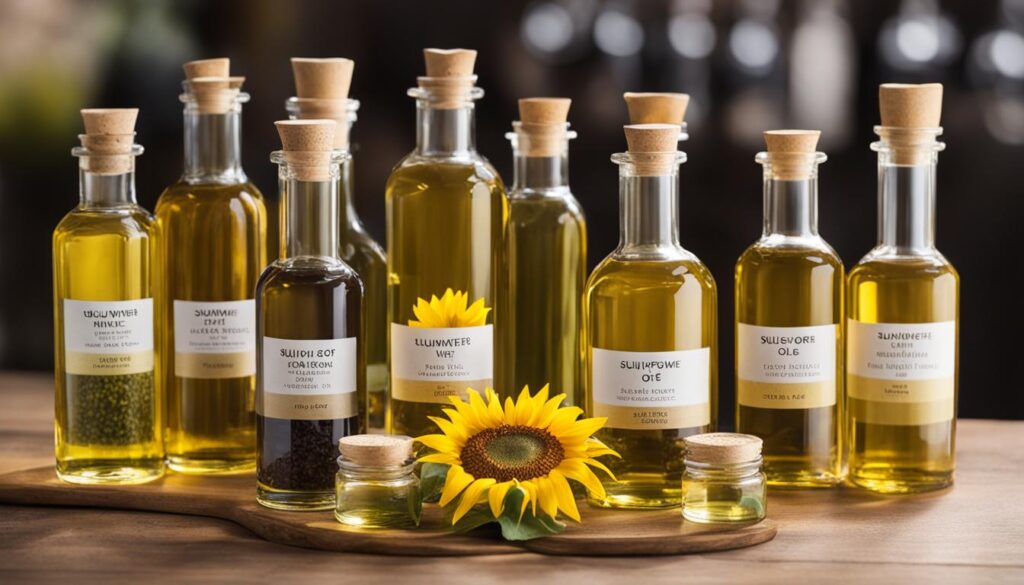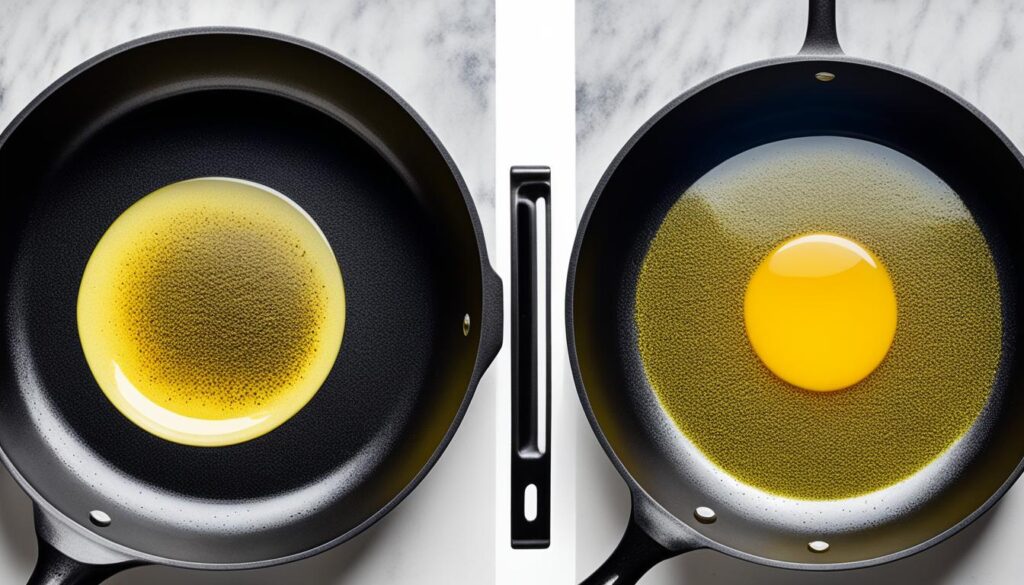Welcome to my article on the incredible benefits of sunflower oil. As a professional journalist, I am excited to share with you the amazing advantages of this healthy cooking oil. Sunflower oil has gained popularity in recent years as a heart-healthy option that can be incorporated into a well-balanced diet. Its abundance of nutrients makes it an excellent choice for promoting overall well-being. Let’s dive into the nutritional value of sunflower oil and explore why it is a perfect addition to a healthy lifestyle.
Key Takeaways:
- Sunflower oil is a healthy cooking oil ideal for a balanced diet.
- It is rich in essential nutrients and offers numerous benefits for overall well-being.
- Choosing sunflower oil as a heart-healthy option can support proper body functioning.
- It is important to choose the right type of sunflower oil and use it in moderation.
- Incorporating sunflower oil into a healthy diet can have positive effects on heart health, skin health, and immune function.
The Origins of Sunflower Oil: A Culinary Staple
Sunflower oil, a popular culinary staple globally, has its origins in North America. Derived from the seeds of the sunflower plant, scientifically known as Helianthus annuus, sunflower oil has been used for thousands of years. Indigenous peoples of North America recognized the versatility of sunflower seeds and utilized them for various purposes, including food, skincare, and medicine.
“The sunflower is a favorite staple among Native American tribes, who value its nutritional and medicinal properties. They use sunflower seeds as a food source, incorporate the oil into their skincare rituals, and even make poultices from the flowers for healing wounds.”
In the 19th century, sunflower oil production gained momentum, particularly in Eastern Europe. The region’s favorable climate for sunflower cultivation contributed to the rapid expansion of sunflower oil production. As a result, Eastern Europe became a significant producer and exporter of sunflower oil, meeting the growing demand worldwide.
Today, sunflower oil remains a vital ingredient in many culinary traditions globally. Its mild flavor and high smoke point make it suitable for various cooking methods, including frying, sautéing, and baking. Sunflower oil’s versatility, coupled with its widespread availability, has solidified its position as a culinary staple in households and professional kitchens alike.
Production of Sunflower Oil
The production process of sunflower oil involves extracting oil from the seeds through pressing or solvent extraction methods. Once harvested, the sunflower seeds undergo a series of cleaning, dehulling, and grinding processes. The resulting sunflower seed cake is then pressed, generating oil that is further refined and filtered to ensure quality and purity.
Understanding Different Types of Sunflower Oil
Sunflower oil is a versatile cooking oil that comes in different types, each offering unique benefits. It’s important to understand the differences between these types to make informed choices for your health and cooking needs.
Types of Sunflower Oil
There are three main types of sunflower oil: high oleic sunflower oil, high linoleic sunflower oil, and mid-oleic sunflower oil.
- High Oleic Sunflower Oil: This type of sunflower oil is rich in monounsaturated fats, particularly oleic acid. It is considered the healthiest option among the three types. High oleic sunflower oil has excellent heat stability, making it suitable for high-heat cooking methods like frying and baking. It has been linked to various health benefits, including improved heart health and reduced inflammation.
- High Linoleic Sunflower Oil: High linoleic sunflower oil is high in polyunsaturated fats, specifically linoleic acid. While it offers nutritional benefits, including essential fatty acids, it is important to consume it in moderation. Excessive intake of high linoleic sunflower oil may increase the ratio of omega-6 to omega-3 fats in your diet, which can lead to inflammation. It is best used in salad dressings and low-heat cooking methods.
- Mid-Oleic Sunflower Oil: Mid-oleic sunflower oil falls between high oleic and high linoleic sunflower oil in terms of its fatty acid composition. It offers a balance of monounsaturated and polyunsaturated fats, making it a versatile cooking oil. Mid-oleic sunflower oil is suitable for moderate-heat cooking methods and can be used in a variety of recipes.
The Benefits of High-Oleic Sunflower Oil
High-oleic sunflower oil, with its high monounsaturated fat content, offers several health benefits:
- Heart health: High-oleic sunflower oil has been associated with improved heart health. It can help lower bad cholesterol levels and reduce the risk of cardiovascular diseases.
- Stability under heat: High-oleic sunflower oil has a high smoke point and remains stable at high temperatures. This makes it a suitable choice for frying and other high-heat cooking methods.
- Vitamin E content: Sunflower oil is a rich source of vitamin E, an antioxidant that protects the body’s cells from damage caused by free radicals.
The Benefits of Mid-Oleic Sunflower Oil
Mid-oleic sunflower oil offers a balance of monounsaturated and polyunsaturated fats, providing the following benefits:
- Dietary versatility: Mid-oleic sunflower oil can be used in a wide range of cooking applications, from sautéing to baking.
- Stability under heat: Similar to high-oleic sunflower oil, mid-oleic sunflower oil has good heat stability, making it suitable for moderate-heat cooking.
- Essential fatty acids: Mid-oleic sunflower oil contains both omega-6 and omega-3 fatty acids, which are essential for the body’s proper functioning.
Choosing the right type of sunflower oil depends on your specific cooking needs and health goals. High oleic sunflower oil is the preferred option for high-heat cooking and offers significant health benefits. Mid-oleic sunflower oil provides versatility and a balanced fatty acid profile. It’s important to use sunflower oil in moderation as part of a balanced diet.

The Nutritional Profile of Sunflower Oil
Sunflower oil is a versatile cooking oil that offers an impressive nutritional profile. It is rich in essential nutrients, including vitamins and healthy fats, making it a nutritious choice for your diet.
Here is a closer look at the nutritional value of sunflower oil:
Vitamins in Sunflower Oil
Sunflower oil contains various vitamins that play vital roles in maintaining overall health. It is particularly rich in vitamin E, a powerful antioxidant that helps protect cells from damage caused by free radicals. Additionally, sunflower oil contains B vitamins, including folate and niacin, which are essential for energy production, nerve function, and the metabolism of carbohydrates, proteins, and fats.
Fats in Sunflower Oil
The fatty acid profile of sunflower oil is diverse and beneficial for your health. It consists of saturated fats, monounsaturated fats, and polyunsaturated fats. Saturated fats provide energy and play a crucial role in hormone production and cell membrane structure. Monounsaturated fats, such as oleic acid, have been shown to support heart health and reduce inflammation. Polyunsaturated fats, including omega-6 fatty acids, are essential fatty acids that the body needs for various functions, but it’s important to consume them in moderation.
Calorie Content of Sunflower Oil
Sunflower oil is an energy-dense food due to its fat content. It contains approximately 120 calories per tablespoon. While it can contribute to your daily calorie intake, it’s essential to consume sunflower oil in moderation as part of a balanced diet.
The Health Benefits of Sunflower Oil
Sunflower oil is not only a delicious cooking oil but also provides numerous health benefits. Its nutrient content, including high levels of monounsaturated fats and vitamin E, contributes to various advantages for the heart, skin, and immune system.
Heart Health Benefits
The high-oleic variety of sunflower oil plays a significant role in promoting heart health. Its monounsaturated fats help to normalize cholesterol levels and reduce inflammation, thereby reducing the risk of heart disease. Incorporating high-oleic sunflower oil into your diet can contribute to a healthier cardiovascular system.
Skin Benefits
The vitamin E content in sunflower oil provides remarkable benefits for the skin. Vitamin E acts as a powerful antioxidant, protecting skin cells from damage caused by free radicals. Regular use of sunflower oil can help maintain healthy, radiant skin and prevent premature aging.
Immune-Boosting Properties
Sunflower oil boasts immune-boosting properties due to its antioxidant effects. The antioxidants in sunflower oil help to fight off harmful free radicals in the body, strengthening the immune system and promoting overall well-being.

| Benefits of Sunflower Oil | |
|---|---|
| Heart Health | Promotes a healthy cardiovascular system by reducing cholesterol levels and inflammation. |
| Skin Health | Protects skin cells from damage and promotes a healthy, youthful appearance. |
| Immune System | Boosts the immune system through its antioxidant properties, fighting off free radicals. |
Potential Concerns and Risks of Sunflower Oil
While sunflower oil offers numerous benefits for overall health, it’s essential to be aware of its potential risks and concerns. Excessive intake of omega-6 fatty acids, which are abundant in high-linoleic sunflower oil, can lead to inflammation in the body. It’s crucial to maintain a balanced omega-6 to omega-3 ratio for optimal health.
Another concern is the oxidation of sunflower oil during high-heat cooking. When exposed to high temperatures repeatedly, sunflower oil can produce harmful compounds that may have a negative impact on health. This is particularly relevant for high-linoleic sunflower oil used in deep frying.
It’s important to be mindful of these potential risks and use sunflower oil in moderation. Choosing high-oleic sunflower oil, which is more stable and contains healthier monounsaturated fats, can be a better option. Additionally, considering alternative cooking oils that have a higher smoke point and better heat stability is advisable.
“Consuming sunflower oil in moderation and considering alternative cooking oils with higher heat stability can help mitigate potential risks.”
It’s always wise to consult with a healthcare professional or a registered dietitian to understand your specific dietary needs and make informed choices.
| Risks of Sunflower Oil | Solutions and Suggestions |
|---|---|
| Excessive omega-6 intake | Ensure a balanced omega-6 to omega-3 ratio |
| Oxidation during high-heat cooking | Choose high-oleic sunflower oil or alternative heat-stable cooking oils |
The Importance of Balance
Maintaining a balanced diet is crucial for overall health and well-being. While sunflower oil can be a part of a healthy diet, it’s essential to use it in moderation and take into account its potential risks. By being mindful of your intake and making informed choices, you can enjoy the benefits of sunflower oil while minimizing any potential downsides.
Comparing Sunflower Oil to Other Cooking Oils
When it comes to cooking oils, sunflower oil is a popular choice. But how does it stack up against other oils like olive oil, canola oil, and coconut oil? Let’s compare their nutritional profiles and health benefits to determine which oil comes out on top.
Sunflower Oil vs. Olive Oil
Olive oil is often hailed as a healthy option due to its high content of monounsaturated fats and beneficial phytochemicals. These fats are known to promote heart health and reduce the risk of chronic diseases. However, sunflower oil also contains a significant amount of monounsaturated fats, making it a comparable choice. One advantage of sunflower oil over olive oil is its higher smoke point, which makes it suitable for high-heat cooking methods like frying.
Sunflower Oil vs. Canola Oil
Canola oil, like sunflower oil, is rich in monounsaturated fats. However, canola oil has a more balanced ratio of omega-6 to omega-3 fatty acids, which is important for overall health. Sunflower oil, on the other hand, contains more omega-6 fatty acids, which can be pro-inflammatory in excess. If you’re looking to reduce inflammation in your diet, canola oil may be a better choice.
Sunflower Oil vs. Coconut Oil
Coconut oil has gained popularity in recent years for its unique composition of saturated fats. While saturated fats have been historically linked to heart disease, coconut oil contains a high proportion of medium-chain triglycerides (MCTs), which are believed to have potential health benefits. However, the majority of studies supporting these claims are preliminary and more research is needed. In terms of heart health, sunflower oil remains a safer choice due to its lower saturated fat content.
| Sunflower Oil | Olive Oil | Canola Oil | Coconut Oil | |
|---|---|---|---|---|
| Monounsaturated fats | Yes | Yes | Yes | No |
| Polyunsaturated fats | Yes | No | Yes | No |
| Saturated fats | Yes | Yes | Yes | Yes |
| Omega-6 to Omega-3 ratio | Higher | Lower | More balanced | N/A |
| Smoke point | Higher | Lower | Higher | Lower |
While sunflower oil offers its own set of health benefits, particularly its high content of monounsaturated fats and suitability for high-heat cooking, it’s important to consider your specific dietary needs and preferences when choosing an oil. Consulting with a healthcare professional or registered dietitian can provide personalized advice and guidance to help you make the best choice for your health.

Overall, olive oil, canola oil, and coconut oil all have their own unique characteristics and health benefits. Sunflower oil is a worthy competitor, offering its own advantages such as a higher smoke point and a similar profile of monounsaturated fats as olive oil. When it comes to heart health, olive oil remains the top choice. Ultimately, incorporating a variety of cooking oils in moderation can provide a diverse range of nutrients and flavors in your diet.
Making Informed Choices: Selecting the Right Sunflower Oil
When it comes to choosing the right sunflower oil, it’s important to understand the differences between high-oleic and high-linoleic varieties. By making informed choices, you can ensure that you’re using the most suitable option for your cooking needs and overall health.
High-Oleic Sunflower Oil: This type of sunflower oil is a healthier option due to its high content of monounsaturated fats. These fats are known for their heart-healthy benefits and stability under high heat. High-oleic sunflower oil is ideal for various cooking applications, including sautéing, baking, and stir-frying. Its mild flavor allows it to blend well with different ingredients while providing the desired health benefits.
High-Linoleic Sunflower Oil: While high-linoleic sunflower oil is rich in essential fats, it is not as heat-resistant as high-oleic sunflower oil. This means that it may not be suitable for high-temperature cooking methods, such as deep frying. However, high-linoleic sunflower oil can still be a part of a balanced diet when used in moderation and in cooking methods that do not require high heat.
By opting for high-oleic sunflower oil, you can enjoy the health benefits while ensuring stability and versatility in your cooking. Incorporate it into your daily meals and recipes to enhance the nutritional value without compromising on taste or quality.
| Aspect | High-Oleic Sunflower Oil | High-Linoleic Sunflower Oil |
|---|---|---|
| Fat Content | High in monounsaturated fats | High in polyunsaturated fats |
| Heat Stability | More stable under high heat | Less stable under high heat |
| Cooking Applications | Ideal for sautéing, baking, and stir-frying | Suitable for low to medium-heat cooking |
| Recommended Use | Versatile option for daily cooking | Use in moderation and low-heat cooking |
Conclusion
Summing up, it is evident that sunflower oil is indeed a healthy choice for cooking. With its rich nutritional profile, including vitamin E and healthy fats, sunflower oil offers a range of benefits for overall well-being. By incorporating sunflower oil into a balanced diet, individuals can promote heart health, maintain healthy skin, and support immune function.
However, it is crucial to make informed choices when selecting sunflower oil. Opting for high-oleic sunflower oil, known for its stability under heat and abundance of monounsaturated fats, is the ideal choice for reaping the maximum benefits. It is also important to use sunflower oil in moderation to avoid potential risks associated with excessive omega-6 intake and oxidation during high-heat cooking.
In conclusion, by incorporating sunflower oil into a healthy lifestyle and choosing the right type of sunflower oil, individuals can enjoy the numerous benefits it offers. Sunflower oil is truly a valuable addition to a nutritious diet, promoting overall wellness and enhancing the flavors of your favorite dishes.
FAQ
Is sunflower oil a healthy cooking oil?
Yes, sunflower oil is a healthy cooking oil with numerous benefits for overall well-being. Its high nutritional value and heart-healthy properties make it an excellent choice for incorporating into a healthy diet.
What are the benefits of sunflower oil?
Sunflower oil is rich in essential nutrients, including vitamin E and healthy fats. It offers various benefits such as supporting heart health, promoting healthier skin, and boosting immune function.
Are all types of sunflower oil the same?
No, there are different types of sunflower oil. The healthiest option is high-oleic sunflower oil, rich in monounsaturated fats. High-linoleic sunflower oil, high in polyunsaturated fats, may pose some risks when consumed excessively.
What nutrients are found in sunflower oil?
Sunflower oil contains essential nutrients such as vitamin E, B vitamins, folate, and niacin. Its fatty acid profile includes saturated fats, monounsaturated fats, and polyunsaturated fats.
Can sunflower oil benefit heart health?
Yes, high-oleic sunflower oil, with its abundance of monounsaturated fats, is linked to heart health. It helps normalize cholesterol levels, reduces inflammation, and lowers the risk of heart disease.
Are there any potential risks associated with sunflower oil?
When consumed in excessive amounts, high-linoleic sunflower oil, which is high in omega-6 fats, can lead to inflammation. Additionally, when heated repeatedly, sunflower oil can produce harmful compounds that may pose risks to health.
How does sunflower oil compare to other cooking oils?
Sunflower oil competes with other cooking oils such as olive oil, canola oil, and coconut oil. While all have their benefits, olive oil is widely considered the healthiest option for heart health.
How can I choose the right sunflower oil?
It is crucial to choose high-oleic sunflower oil, which is the healthier option. It is suitable for various cooking applications and offers stability under heat.
What is the summary of the benefits of sunflower oil?
Sunflower oil is a nutritious and healthy cooking oil that offers a wide range of benefits, including supporting heart health, promoting healthier skin, and boosting immune function.






